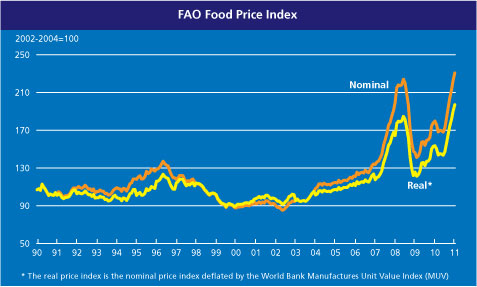For the last two months, North Korea has been frantically begging for food around the world, according to South Korea’s JoongAng Daily. The request has extended to dozens of countries, including China, the U.S., EU, and countries in southeast Asia.
 Striking museum workers in Cairo on Wednesday (AP)
Striking museum workers in Cairo on Wednesday (AP)
The North Koreans desperate need for food is apparently responsible for initiating the silly charade that went on the last few days. The North Koreans have a history of wanting to “talk” only when they can use the talks to extort aid, especially food aid. Still, the Norks have been so insistent for the last few weeks, that finally the South agreed to “talk.” For the last few days, we’ve had bubbly stories on the BBC and elsewhere about how things have finally turned around, and a new era of sunshine was opening on the Korean Peninsula.
The talks collapsed in two days, when the Norks stormed out of the meeting, after the South wanted to discuss last year’s sinking of the South Korean warship Cheonan, and the shelling of Yeonpyeong Island, killing about 50 South Koreans, according to the Korea Times. The South’s demands for an apology reflects a significant hardening of policy since previous talks.
Nor are the North Koreans likely to get much food aid from China, which is deep into its own problems, according to Xinhua. China is suffering the worst drought in 60 years, crippling the country’s major agricultural regions, leaving many of them parched.
China is the world’s largest wheat producer, according to the NY Times, and if they’re forced to import large amounts of wheat, it could send shock waves through the world’s grain markets. “They can buy whatever they need to buy, and they can outbid anyone,” according to one expert, which means that they can bid prices up as high as they want.
Wheat prices are also playing a role in the Egyptian revolution, as wildcat strikes are spreading around the country, and are threatening closure of the Suez Canal. Closure of the canal would be a crisis for Europe, according to EurActive, because Europe depends on oil supplies shipped through the canal. It would also be a crisis for Egypt, not only because of the loss of canal revenue, but also because Egypt depends on wheat imports from other countries.
Suez Canal workers have, in fact, gone on strike, according to Bloomberg, but so far the canal is operating normally.
 FAO Food Price Index – 1991 to January 2011
FAO Food Price Index – 1991 to January 2011
Food prices are only going to go higher. Food prices were already at historic highs in December, and then they rose an additional 3.4% in January, according to the U.N. Food and Agriculture Organization.
And now, on Wednesday, the US Dept. of Agriculture (USDA) announced that supplies of corn and wheat this year will be well below previous forecasts, according to Reuters, thanks to increased demand for cattle feed and ethanol production.
David Dawe of the FAO explained what has happened in an interview on Bloomberg TV (my transcription):
“Food prices got really low of around 2000. That is about when they hit their trough, and a lot of that was due to investment in technology through agricultural research.
[For example,] governments building roads to move extra production to markets. But certainly a big factor was much higher yields for rice. that was the culmination of a lot of research.
The research funding has fallen off in recent years, especially for some of the cereals and that gradually lead to high prices. We saw prices go from 2000 to about 2007, more or less steadily.”
Professor Art Barnaby of Kansas State University provided some additional reasons:
“What’s driving the [prices] are the corn numbers. When you look at the supply demand numbers, we are now putting two Iowa corn crops in the gas tanks.
And if you look at the history going back to 2002, the ethanol number is growing every year, and that’s what’s really driven the whole market. Now the question becomes, if you change government policy, and reduce some of the tax incentives that are built into this ethanol climate, what will that do to the demand for ethanol in this corn complex. And I’m sure that it will back off the demand. I’m not sure we’re going to back to where we were in 2002, but on the other hand we’ve discovered we can produce a lot more corn. It’s those corn numbers though, that are dragging acres out of wheat and soybeans, and maintaining those prices.
Even cotton now has some really strong prices. Again corn is out there bidding more acres into production.”
And so, since the year 2000, research funding on food production has been cut off, and huge amounts of existing food production have been diverted to ethanol.
If anybody ever had difficulty understanding the significance and importance of generational dynamics factors in the flow of history, then surely this example will resolve those difficulties.
It is truly mind-boggling that, since the year 2000, food production has been taken for granted by world officials, It’s like Mad Magazine’s Afred E Neuman saying, “What, me worry?”
The survivors of World War II (GI and Silent generations) saw how destructive famines can be, and they set up the Green Revolution and the FAO to make sure that everyone would be fed. But no sooner did the Silents retire in the 1990s, then officials abandoned food research and diverted the remaining food production. It’s truly amazing.
I like to compare high food prices to high blood pressure in an individual — a kind of silent killer, until it’s no longer silent.
A great famine in 1788 led to the French Revolution. The Tunisia and Egypt revolutions began as food riots. When a man can’t feed himself and his family, he will not sit quietly.
From Korea to Egypt, and around the rest of the world, the greatest threat to world stability today is the continual surge in food prices. Unless food prices fall this year, which nobody is predicting as far as I know, the world could be a different place by the end of the year.
COMMENTS
Please let us know if you're having issues with commenting.